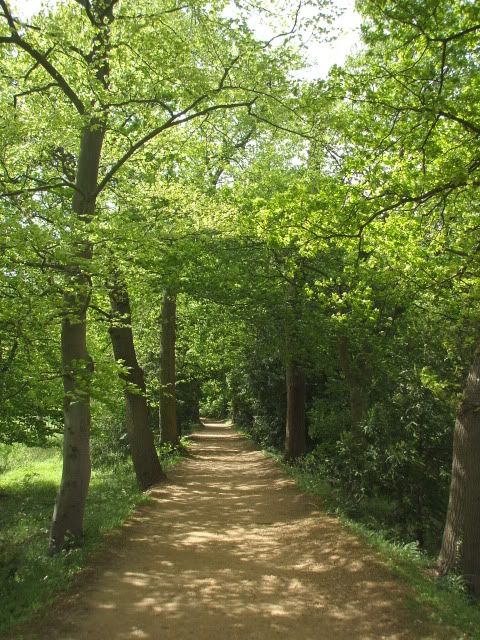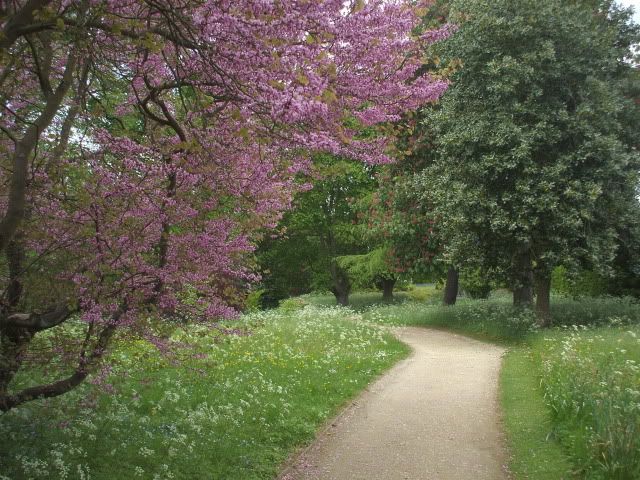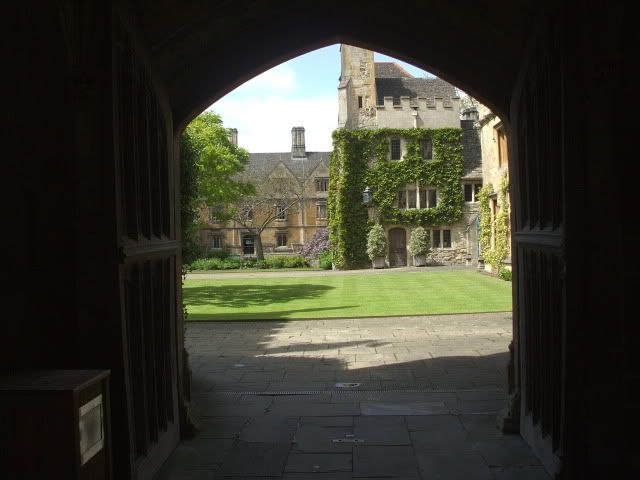Days of excess perfection
I’ve had a nice few days. Steve has been on nights so I’ve had to either be real quiet or be out of the house during the day. So on Wednesday I went and helped out at the Wednesday afternoon tea my church puts on for mums in the community, then went to the Eagle & Child for coffee. I sat all alone in the Rabbit Room, where the Inklings used to meet for their Tuesday morning pipe, pint and argusation session. It was fantastic sitting there all by myself with an execrable coffee and a volume of CS Lewis’s diary, with the photos of the great men staring down at me. Then I cycled home through the glittery late afternoon sunshine, stopping for dinner ingredients on the way.
On Thursday I stayed in all day and painted (I’m doing a painting of Tintern Abbey, which I think is going to be pretty good. Having problems with one section though.) Then in the evening I caught the bus into town to go to a forum at the Sheldonian called ‘City of God? : Judaism, Christianity and Islam in the Public Square’. It was a discussion about the place of religion, specifically the three Abrahamic faiths, in an increasingly secular world. It was, like every other scholarly event I’ve been to, world-class. The three panelists were clearly at the very spearhead of scholarship and research in their respective traditions, and also so blisteringly intelligent that they clearly grasped the point of the evening - a passionate but mutually respectful discussion on how the three faiths differ but are similar and could work together in a world that’s falling apart. Sadly, during the Q&A most of the questioners did not keep this in mind.
The really interesting thing for me was how the audience polarised, or seemed to. I know that there is a vibrant Jewish community in Oxford, in fact they were joint organisers of the event. Yet, in terms of this particular discussion, although Dr Naftali Brawer (head of Jewish-Muslim relations for the Chief Rabbi of the UK) had immensely interesting things to say, he may as well have not been on the platform. I think he realised it too. On a few occasions he would, when appealed to, acknowledge that the question was better put to either Rev Dr Nazir-Ali (Bishop of Rochester and a member of the House of Lords) or Prof Tariq Ramadan (from the Oxford faculty of Theology). He had his say, and the moderator was absolutely fair in giving each panelist equal time, but it seemed clear that the attention of the audience was riveted on the other two.
There were a couple of occasions when the moderator asked particularly difficult questions - one on religious conflict and another on the attitude of each tradition to those who wished to leave/dissent - when the audience fell absolutely dead silent - no rustling, coughing, shifting, nothing. It was like the whole audience seemed to stop breathing. Everyone wanted to hear what the Christian and Muslim would say, and how they’d react to each other.
It seemed to me, looking at these three learned men ably representing their faith, that the future of the world was represented on that stage. Realistically, Buddhism, Hinduism, Shintoism and Kabbalah are not going to take over the world. In terms of absolutist faiths; growing, striving, uncompromising, passionate faiths, Islam and Christianity are a force to be reckoned with. I personally believe that Judaism, while historically important and with an enormous part yet to play, is not so much. It seems more concerned with personal study, scholarship, and worship of God than outreach. (As far as I know, Judaism doesn’t actively encourage people to join the Jewish faith except in the case of marriage or existing Jewish heritage, whereas Christianity does and Islam does accept converts.) I was also really interested to hear secularism spoken of by all three as a powerful ideology of its own, and not just a default position.
During the question time, I was ashamed for both the Christians and Muslims who spoke. The ‘questions’ were as polarising, accusatory and extreme as possible, and both Prof Ramadan and Bishop Nazir-Ali were hard-pressed to stay calm. In fact, at the very end Prof Ramadan started firing questions at Nazir-Ali and the moderator very graciously brought the evening to a close. It was intellectual fireworks, and again I was privileged to be in this place and to be able to attend. I’m still thinking about it, and need to transcribe my messy notes and do some reading about some of the things that came up.
Yesterday I read about a free concert of Bach cantatas in the Magdalen ante-chapel, so made my way there at one. I’ve been wanting to get inside Magdalen to explore the CS Lewis connection since we got here, but wanted to do it properly (with respect to Steve, that means alone. He’s not such a CSL nut as I am!) Magdalen’s open to the public for £4, but since I was going to the concert I got in free. After the concert I walked into the beautiful cloisters around the quad, then down to the river past New Buildings (1700s), which is where CSL lived and taught. I’ve been reading Volume One of his letters and transcribing the bits that I love or speak to me about Oxford, and came across this the other day. It was so evocative that it made me catch my breath:
“You should come if only to enter Magdalen after dark across the grove by my master key - on a moonlit night. And if there is no moon (dazzlingly white among the trees after a long dark cobbled passage) perhaps instead there will be thick darkness and drumming rain and the hoofs of the deer (invisible) scampering away - and ahead the long lighted line of the cloisters in New Buildings...”
CSL - A.K. Jenkin, 1925
I walked down to New Buildings, past the wisteria-clad cloisters, through the gate to Addison’s Walk, with the sun-dappled Cherwell to my left, beyond that the smooth lawn with the deer grazing under the study windows, and the vast water-meadow to my right. I walked along, totally alone, dazed by the light and the occasional drafts of perfume, the bluebells thick along the river banks, and the sheer unbelievable beauty of the path, for what must have been a couple of kilometres. I came to another gate and went through it, and saw a punt tied up to the river bank with an old couple eating a picnic lunch in the long grass. Another couple of punts came along, each poled by a single young man with three or four more lying lazily in the bottom. I climbed a small hill, down a fork in the path and came to an incredible wild garden, every bend in the path more beautiful than the one before, meadows of bluebells and meadowsweet on either side. I eventually turned back to the first gate, which had a wooden bench beside it, looking out over the water-meadow to the Magdalen tower. I sat down and read some more CSL, and as I looked out over acres of lush greenery to the spire, the wind rose and leaves and petals fell in their hundreds from the trees and coated me. It was absolute perfection. And I sat there, looking at all this beauty, and thought no wonder Narnia, and Perelandra, and Middle Earth were conceived here - it’s as though you can’t help being your best, most noble, most creative self in this place. The very landscape demands it.

Addison’s Walk, the Cherwell to the right.

The Fellows’ Garden, Magdalen.

Looking from the ante-chapel to the Magdalen entry court.
On Thursday I stayed in all day and painted (I’m doing a painting of Tintern Abbey, which I think is going to be pretty good. Having problems with one section though.) Then in the evening I caught the bus into town to go to a forum at the Sheldonian called ‘City of God? : Judaism, Christianity and Islam in the Public Square’. It was a discussion about the place of religion, specifically the three Abrahamic faiths, in an increasingly secular world. It was, like every other scholarly event I’ve been to, world-class. The three panelists were clearly at the very spearhead of scholarship and research in their respective traditions, and also so blisteringly intelligent that they clearly grasped the point of the evening - a passionate but mutually respectful discussion on how the three faiths differ but are similar and could work together in a world that’s falling apart. Sadly, during the Q&A most of the questioners did not keep this in mind.
The really interesting thing for me was how the audience polarised, or seemed to. I know that there is a vibrant Jewish community in Oxford, in fact they were joint organisers of the event. Yet, in terms of this particular discussion, although Dr Naftali Brawer (head of Jewish-Muslim relations for the Chief Rabbi of the UK) had immensely interesting things to say, he may as well have not been on the platform. I think he realised it too. On a few occasions he would, when appealed to, acknowledge that the question was better put to either Rev Dr Nazir-Ali (Bishop of Rochester and a member of the House of Lords) or Prof Tariq Ramadan (from the Oxford faculty of Theology). He had his say, and the moderator was absolutely fair in giving each panelist equal time, but it seemed clear that the attention of the audience was riveted on the other two.
There were a couple of occasions when the moderator asked particularly difficult questions - one on religious conflict and another on the attitude of each tradition to those who wished to leave/dissent - when the audience fell absolutely dead silent - no rustling, coughing, shifting, nothing. It was like the whole audience seemed to stop breathing. Everyone wanted to hear what the Christian and Muslim would say, and how they’d react to each other.
It seemed to me, looking at these three learned men ably representing their faith, that the future of the world was represented on that stage. Realistically, Buddhism, Hinduism, Shintoism and Kabbalah are not going to take over the world. In terms of absolutist faiths; growing, striving, uncompromising, passionate faiths, Islam and Christianity are a force to be reckoned with. I personally believe that Judaism, while historically important and with an enormous part yet to play, is not so much. It seems more concerned with personal study, scholarship, and worship of God than outreach. (As far as I know, Judaism doesn’t actively encourage people to join the Jewish faith except in the case of marriage or existing Jewish heritage, whereas Christianity does and Islam does accept converts.) I was also really interested to hear secularism spoken of by all three as a powerful ideology of its own, and not just a default position.
During the question time, I was ashamed for both the Christians and Muslims who spoke. The ‘questions’ were as polarising, accusatory and extreme as possible, and both Prof Ramadan and Bishop Nazir-Ali were hard-pressed to stay calm. In fact, at the very end Prof Ramadan started firing questions at Nazir-Ali and the moderator very graciously brought the evening to a close. It was intellectual fireworks, and again I was privileged to be in this place and to be able to attend. I’m still thinking about it, and need to transcribe my messy notes and do some reading about some of the things that came up.
Yesterday I read about a free concert of Bach cantatas in the Magdalen ante-chapel, so made my way there at one. I’ve been wanting to get inside Magdalen to explore the CS Lewis connection since we got here, but wanted to do it properly (with respect to Steve, that means alone. He’s not such a CSL nut as I am!) Magdalen’s open to the public for £4, but since I was going to the concert I got in free. After the concert I walked into the beautiful cloisters around the quad, then down to the river past New Buildings (1700s), which is where CSL lived and taught. I’ve been reading Volume One of his letters and transcribing the bits that I love or speak to me about Oxford, and came across this the other day. It was so evocative that it made me catch my breath:
“You should come if only to enter Magdalen after dark across the grove by my master key - on a moonlit night. And if there is no moon (dazzlingly white among the trees after a long dark cobbled passage) perhaps instead there will be thick darkness and drumming rain and the hoofs of the deer (invisible) scampering away - and ahead the long lighted line of the cloisters in New Buildings...”
CSL - A.K. Jenkin, 1925
I walked down to New Buildings, past the wisteria-clad cloisters, through the gate to Addison’s Walk, with the sun-dappled Cherwell to my left, beyond that the smooth lawn with the deer grazing under the study windows, and the vast water-meadow to my right. I walked along, totally alone, dazed by the light and the occasional drafts of perfume, the bluebells thick along the river banks, and the sheer unbelievable beauty of the path, for what must have been a couple of kilometres. I came to another gate and went through it, and saw a punt tied up to the river bank with an old couple eating a picnic lunch in the long grass. Another couple of punts came along, each poled by a single young man with three or four more lying lazily in the bottom. I climbed a small hill, down a fork in the path and came to an incredible wild garden, every bend in the path more beautiful than the one before, meadows of bluebells and meadowsweet on either side. I eventually turned back to the first gate, which had a wooden bench beside it, looking out over the water-meadow to the Magdalen tower. I sat down and read some more CSL, and as I looked out over acres of lush greenery to the spire, the wind rose and leaves and petals fell in their hundreds from the trees and coated me. It was absolute perfection. And I sat there, looking at all this beauty, and thought no wonder Narnia, and Perelandra, and Middle Earth were conceived here - it’s as though you can’t help being your best, most noble, most creative self in this place. The very landscape demands it.

Addison’s Walk, the Cherwell to the right.

The Fellows’ Garden, Magdalen.

Looking from the ante-chapel to the Magdalen entry court.